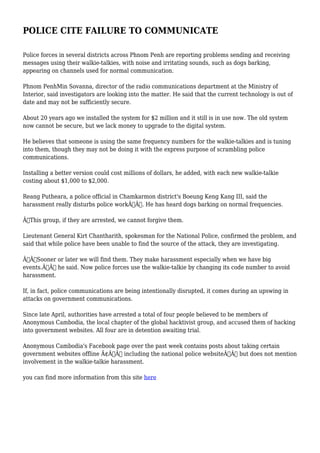
POLICE CITE FAILURE TO COMMUNICATE
- 1. POLICE CITE FAILURE TO COMMUNICATE Police forces in several districts across Phnom Penh are reporting problems sending and receiving messages using their walkie-talkies, with noise and irritating sounds, such as dogs barking, appearing on channels used for normal communication. Phnom PenhMin Sovanna, director of the radio communications department at the Ministry of Interior, said investigators are looking into the matter. He said that the current technology is out of date and may not be sufficiently secure. About 20 years ago we installed the system for $2 million and it still is in use now. The old system now cannot be secure, but we lack money to upgrade to the digital system. He believes that someone is using the same frequency numbers for the walkie-talkies and is tuning into them, though they may not be doing it with the express purpose of scrambling police communications. Installing a better version could cost millions of dollars, he added, with each new walkie-talkie costing about $1,000 to $2,000. Reang Putheara, a police official in Chamkarmon district's Boeung Keng Kang III, said the harassment really disturbs police work€Â. He has heard dogs barking on normal frequencies. €This group, if they are arrested, we cannot forgive them. Lieutenant General Kirt Chantharith, spokesman for the National Police, confirmed the problem, and said that while police have been unable to find the source of the attack, they are investigating. €œSooner or later we will find them. They make harassment especially when we have big events.€ he said. Now police forces use the walkie-talkie by changing its code number to avoid harassment. If, in fact, police communications are being intentionally disrupted, it comes during an upswing in attacks on government communications. Since late April, authorities have arrested a total of four people believed to be members of Anonymous Cambodia, the local chapter of the global hacktivist group, and accused them of hacking into government websites. All four are in detention awaiting trial. Anonymous Cambodia's Facebook page over the past week contains posts about taking certain government websites offline – including the national police website€“ but does not mention involvement in the walkie-talkie harassment. you can find more information from this site here